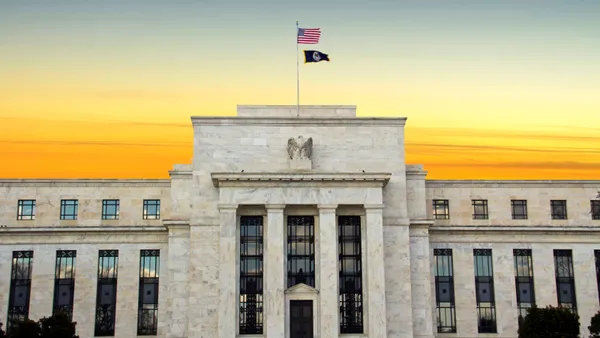Dive Brief:
- More than half (54%) of U.S. banking consumers use apps to manage their finances or make person-to-person payments, but most are unaware how their personal data is stored and shared, or even which data is used, according to a study released this week by payments infrastructure firm, The Clearing House.
- About 70% of the nearly 4,000 people surveyed in July and August said they were confident their information was private and secure. But four in five users were not fully aware that apps or third parties may store their bank account username and password. "Once they realize this, more than two-thirds of users (68%) are uncomfortable with the apps’ level of access," the study’s authors wrote.
- Banks or non-bank financial apps should be responsible for consumers’ education and awareness surrounding data use and access, more than half of the survey’s respondents said.
Dive Insight:
The disconnect surrounding consumers’ assumptions about how financial apps handle their personal data comes down to reading the fine print — literally.
The Clearing House study found financial apps made all the necessary disclosures about how they use consumers’ personal and financial data in their terms and conditions, which consumers must accept before using the app. But at least 79% of consumers don’t take the time to read them, the study found.
Additionally, consumers were unclear on how long financial apps could hold their information. Only 21% correctly noted that data is accessible until a user revokes his or her credentials. More than a quarter (26%) said they believed their data was always accessible. About 17% said they believed their data could only be accessed while the app is open. About 13% said they believed their data could be accessed until they deleted the app. And 21% said they didn’t know how long apps had access to their information.
In the event of a breach, 70% of respondents said the financial app should bear most of the responsibility, according to the survey, which allowed users to choice more than one entity from a list. About 41% said their bank should be responsible; 34% put that burden on regulatory agencies; 18% on the government or Congress. About 10% said the user should hold most of the responsibility for his or her own data.
The study also found consumers "want more control over how third parties access their data." More than half said they’d prefer to use a settings page within the financial app to exercise that control.
Since the European Union passed the General Data Protection Regulation last year, many financial institutions — including apps — have reworked their privacy policies to give consumers more control over their data.
Lawmakers in Congress have grilled tech companies and financial institutions since then on how they handle, share and sell consumers’ personal and financial data.
At a Senate Banking Committee hearing in May, Jay Cline, PricewaterhouseCooper’s privacy and consumer protection leader, said financial institutions need to do more than just comply with privacy laws — they need to ensure consumers understand what they’re signing up for.
Consumers already trust financial institutions more than any other industry with their data, but providing consumers with clearer disclosures and more control over how their data is used could strengthen that trust.
"The highest level of privacy protection in the digital age will result when both companies and consumers exercise their roles to the fullest," Cline said.
Congress plans to evaluate privacy law drafts in December, which could address some of the consumer concerns highlighted in The Clearing House study, according to Politico.












